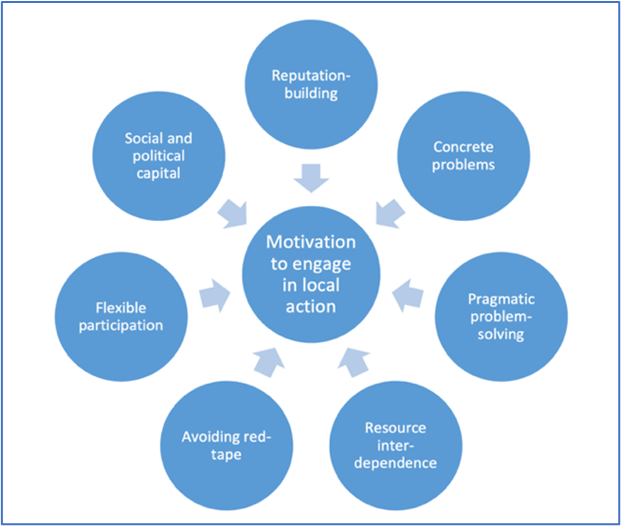Role of Local Leadership in attaining Sustainable Development Goals
Anuradha Saigal & Divya Bawa, March 21, 2024
Published in special edition of Terra Green (TERI), Volume 16, February 2024
“The SDGs represent a global agenda; they require local action to achieve them.”
Achievement of any of the Sustainable Development Goals (SDGs) will require concerted global efforts to achieve all of them. While international collaborations and national policies have crucial significance in this collective pursuit of global sustainability, the roles of local governance and leadership cannot be overlooked. Local leaders are the backbone of effective governance and can have a substantial function in sustainability leadership by engaging citizens, enhancing technical expertise, mobilising financial resources, and developing managerial execution capacity[1]. Due to their proximity to the grassroots, local institutions and governance systems can identify contextual challenges and implement tailor-made solutions based on the geographical, political, cultural, and socio-economic conditions. “Think Global, Act Local”, a widely popular UN Agenda 21 slogan also reflects on promoting local practices while maintaining a broader awareness of the global goals. However, local governments should not be seen as mere implementers of the solutions. Local governments are policy makers, catalysts of change, and the level of government best placed to link the global goals with local communities[2].
It is important to recognise that local leadership encompasses more than local government bodies; it extends beyond governance and involves several other local actors such as Civil Society Organisations (CSOs), philanthropies, research and academic institutions including schools, businesses, Community-Based Organisations, youth groups, activists, and more.
Factors Driving Local Actions
While there is multiple evidence in the literature on the effects of local action in achieving SDGs, there should also be considerations for why local leaders should engage in implementing solutions that support global goals and sustainability. Based on this context, adapting from the chapter titled “The Key Role of Local Governance in Achieving the SDGs” in the book “Co-Creation for Sustainability: The UN SDGs and the Power of Local Partnership”[3], the figure below outlines the seven motivating factors that drive local leaders to contribute to the SDGs.
 Figure 1: Factors That Motivate Local Actors to Promote the SDGs.
Figure 1: Factors That Motivate Local Actors to Promote the SDGs.
The factors given are detailed out below.
- Reputation building: Demonstrating commitment to the SDGs boosts the reputation and status of local stakeholders, such as politicians, agencies, businesses, NGOs, and others.
- Concrete problems: The SDGs tackle issues directly experienced by local communities, organizations, businesses, and families, serving as a powerful motivator.
- Pragmatic problem solving: Involvement in local SDG efforts allows for influence on societal development, avoiding national political conflicts.
- Resource interdependence: Recognition of interdependencies fosters resource exchange among stakeholders.
- Avoiding red-tape: Local decision-making offers quicker action with less bureaucratic hurdles.
- Flexible participation: Participation in local action is more flexible in terms of time and commitment compared to demanding national politics.
- Social and political capital: Lastly, engaging in local problem-solving enhances the acquisition of social and political capital, fostering network relations and reducing loneliness.
Despite these motivating factors, local leaders often fail to participate, plan effectively, or successfully implement activities that contribute to the sustainability of their areas and align with national and global sustainability goals. This failure may be attributed to factors such as lack of awareness, insufficient support from national or state governments, capacity and institutional gaps, weak local governance and accountability, lack of adequate funding, and limited access to local data[4]. Strengthening local leadership- both public and private, holds the potential to overcome these barriers through collaborative efforts, ultimately fostering effective and sustainable solutions.
Key Examples: Local Sustainable Solutions in India
It is widely agreed that India will play a leading role in determining the success or failure of the SDGs, given its disproportionate share in the global development burden[5]. India has made significant progress in decentralising the implementation of Sustainable Development Goals (SDGs) at the sub-national level, engaging states and district bodies, including Urban Local Bodies (ULBs) and Rural Local Bodies (RLBs), in the localisation of SDGs planning, a process overseen by Niti Aayog. At the national level, the Ministry of Panchayati Raj, overseeing rural self-government, advocates integrating SDGs into local plans (known as the Gram Panchayat Development Plans)[6]. However, for such efforts to be fully successful, it is imperative to explore solutions that strengthen local leadership. These solutions encompass resource localisation and mobilising funds from the private sector, enhancing interdepartmental coordination, capacity development for both private and government stakeholders, implementing improved monitoring systems, and creating platforms for engagement and coordination among diverse stakeholders. Proposed key pillars for promoting local leadership include:
- Mainstreaming Local Best Practices into Policy Action: It is crucial to acknowledge the role of integrating successful initiatives undertaken at the local level into broader policy frameworks at regional or national levels. For instance, a pilot project in Raipur and Korba districts addressed indoor air pollution by providing capacity-building training to frontline health workers (Mitanins). This initiative successfully raised awareness about air pollution and health within communities. Due to its success, local policymakers embraced the project, leading to its integration into the Chhattisgarh State Health Resource Center (SHRC). Local champions, therefore, play an essential role in highlighting these best practices to ensure their effective conversion into policies.
- Dissemination of Learnings Across States: Local departments and think tanks operate in each state, tailoring their efforts to local circumstances while designing projects. This learning will be useful for other similar states, for example, Uttarakhand can learn from Himachal Pradesh’s eco-village scheme on promoting climate resilient villages. Another best case is on promoting healthy air zones wherein several CSOs in India are currently accelerating the transition to low/zero-emission and non-motorised transport within cities, by involving ULBs, State Pollution Control Boards, and transport departments, together directed towards the common goal improving local air quality. Facilitating cross-learning amongst states/districts/cities on best-practices from localisation interventions is a commendable approach which local actors can champion to foster collaboration, share knowledge, and accelerate sustainable development initiatives.
- Empowering Local Institutions: National level think tanks and civil society organizations, exemplified by organisations like The Energy Resource Institute (TERI) and the Council on Energy, Environment, and Water (CEEW), known for their excellence in promoting sustainable solutions, can act as vital bridges among diverse stakeholders at both national and subnational levels. These entities can engage in offering technical assistance and support to academic and research institutions on ground, such as schools and colleges, to generate awareness for sustainability, thus empowering them as leaders in sustainability. Further, capacity of local actors especially grassroot CSOs can be strengthened for engaging with the private sector and local businesses to mobilise funds and resources for designing impactful and large-scale projects.
- Data Monitoring and Knowledge Management: Creating dashboards for real-time data on SDG indicators can serve as evidence to influence policy making at sub-national and national levels. For example, NITI Aayog has launched India Climate and Energy Dashboard (ICED)[1] to provide publicly access to the data on climate, energy, economy, and environment to inform policy decisions. Importantly, these dashboards can also prove invaluable in shaping local sustainability initiatives if the data is collected from the grassroots level. Therefore, local actors having rich traditional knowledge and data can help in shaping robust top-down policies using a bottom-up approach.
Empowering local leaders with diverse support is crucial for achieving local outcomes that not only align with community priorities but contribute to global sustainability goals. By fostering collaboration, inclusivity, and innovation, local leadership and action can create a foundation for sustainable development that extends beyond immediate gains to ensure long-term well-being for all. As the SDGs continue to guide our global efforts towards a more equitable and sustainable future, it is imperative that we recognise and empower local leaders as catalysts for positive change. Through their dedication and commitment, local leaders play a crucial role in shaping a world where prosperity, social justice, and environmental stewardship converge for the benefit of present and future generations.
The above article is written by Anuradha Saigal (Programme Manager, Climate Policy, Shakti Sustainable Energy Foundation) and Divya Bawa (Programme Manager, Climate Policy, Shakti Sustainable Energy Foundation).
https://wsds.teriin.org/2024/terragreen_special_edition.php
[1] Wang, X., Van Wart, M., & Lebredo, N. (2014). Sustainability Leadership in a Local Government Context: The Administrator’s Role in the Process. Public Performance & Management Review, 37(3), 339–364. http://www.jstor.org/stable/24735232
[2] Retrieved from https://www.undp.org/ukraine/publications/sustainable-development-goals-what-local-governments-need-know
[3] Ansell, C., Sørensen, E. and Torfing, J. (2022), “The Key Role of Local Governance in Achieving the SDGs”, Co-Creation for Sustainability, Emerald Publishing Limited, Leeds, pp. 9-22. https://doi.org/10.1108/978-1-80043-798-220220002
[4] Retrieved from https://repository.up.ac.za/bitstream/handle/2263/58190/Reddy_Localising_2016.pdf
[5] Retrieved from https://www.niti.gov.in/sites/default/files/2020-07/LSDGs_July_8_Web.pdf
[6] Refer to https://gpdp.nic.in/for more details.

